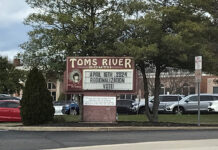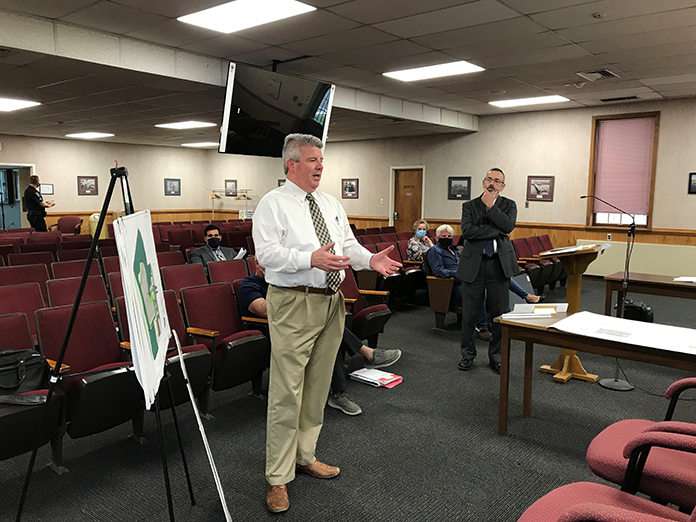
BERKELEY – The Township Zoning Board approved the parameters for a boat yard to continue operating near a residential area, but neighbors doubt the owner will follow the rules.
The issue stems from NJ Outboard suddenly cutting down trees on property they owned. They built boat racks and started operating on the area without township approval.
The area is in the woods between Scott Drive and Browning Avenue, east of Route 9. They were using the intersection near the Wawa gas station and Sylvan Lakes Boulevard to move boats.
Neighbors living behind the property, in the Scott Estates neighborhood, had been protesting it. They said NJ Outboard buried trees on the property, built unsteady racks, and littered with open paint cans and other garbage. A nearby trickle of a stream had an oily sheen on it.
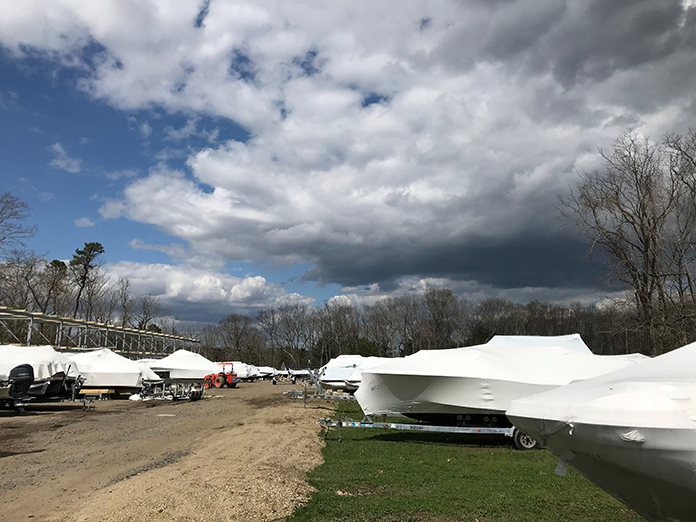
At a Zoning Board meeting last year, the owner of NJ Outboard said through his attorney that he had a reputable contractor who assured him that everything was being done legally. He also said he had a stroke earlier and did not remember what was done.
The township fined them. Residents had said the fines were a slap on the wrist after allowing them to profit off the land all season.
The Township Zoning Board ordered them to do a laundry list of items in the short term while the owner came up with a plan for the long term.
That plan was presented at the most recent Zoning Board meeting.
The 6.18-acre property is split between two zones, the highway business zone and the residential zone. Zoning determines what is allowed on the land.
Engineer Brian Murphy said the developer has done everything it has been asked, including moving boat racks closer to the highway and away from homes, installing fencing, and planting evergreens. They have done soil borings to determine that the land is safe enough to store heavy boats on top. They fixed the bolts on the footings of the storage racks (some of which were found to be very loose).
Some of the smaller improvements were done the morning before the meeting, he said.
The Department of Environmental Protection determines how much impervious coverage is allowed on a piece of property. This means how much is covered by asphalt or something that rainwater can’t filter through.
The only paving will be for five parking spaces and one handicapped parking space in front of a 3,000-square-foot building, Murphy said.
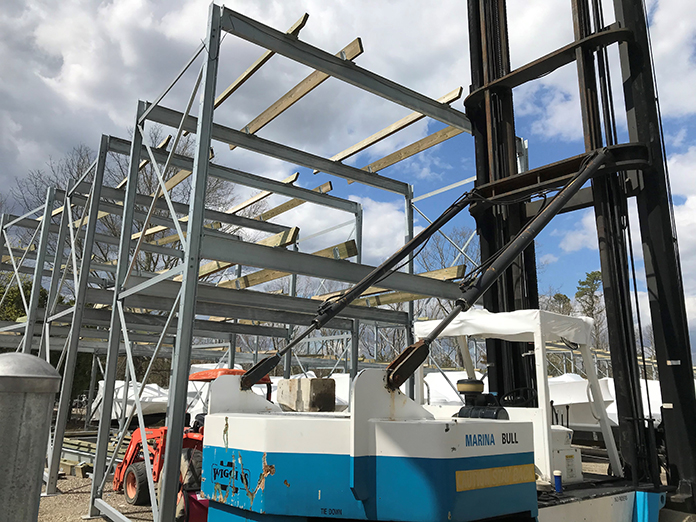
The property will not be open to the public, and will have four to five employees working there at a time, he said.
There will be lighting for security purposes at night, directed away from the neighbors, he said.
There was much discussion of what is actually going to be done on the property.
New boats would come in with no fuel or fluids in them, owner Paul Gioe said. But if someone is paying to store their boats, those would likely have fuel in them. But that fuel would sit in the engines.
There would be painting with biodegradable paint, he said.
Any fiberglass maintenance would be minor patch jobs, he said.
Zoning Board member Edward Gudaitis wanted a recovery system to prevent contaminants from getting into the environment. He also wanted a fire pipe stanchion near the property. “If you’re painting, there’s a possibility of a fire.”
“Do you know how you use shrink wrap? Blowtorch,” Zoning Board chairman Richard Elliot said.
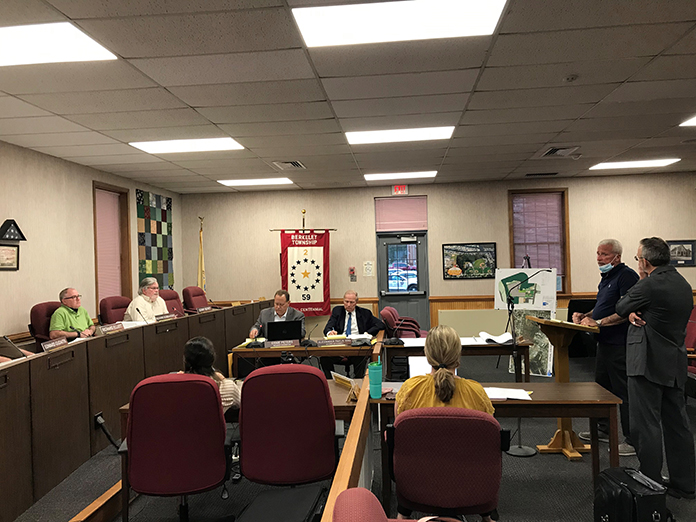
Several Zoning Board members insisted that the entrance to the property needs to be wide enough to allow emergency vehicles to pass by each other.
Elliot said that a copy of the contract between NJ Outboard and the contractor, who was not named, showed that the contractor was instructed to get permits.
“The contractor was supposed to get permits. He did racks in the wrong area. If he did what he was supposed to do, we wouldn’t be here,” Gioe said.
Elliot led part of the testimony to clear up contentions that neighbors had made. He asked questions of the developer’s engineer to explain that the fill on the land is not contaminated and that the water runoff is coming from other properties.
Dorie Craig, whose back yard overlooks the property, has been one of the most vocal members of the opposition. Since the owner clear-cut trees, she said she’s had to deal with noise, garbage and other quality of life issues.
“I look out my window and I see white plastic,” she said of the boat wraps.
“They’re not cleaning up their garbage,” she said.
“You’re right,” Elliot said.
Tom Prosser, an outspoken critic of the development, was not convinced of the approval. Gioe applied for a similar project five years ago and was declined. Therefore, he knows what he’s supposed to do and chose not to go through official channels because he knew it would be declined again, he said.
“We know he winterizes boats. He didn’t follow any rules; we feel he’s going to keep doing it,” he said.
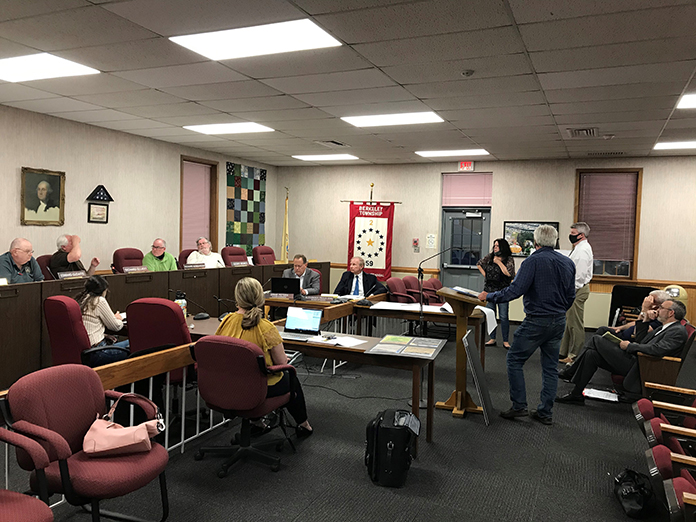
Elliot noted that NJ Outboard has paid $100,000 for permits and engineering since this began.
He told residents that it is better to keep the process local rather than have the owner appeal to Superior Court where the decision could be out of their hands. He showed that the situation has been made better by having the boat racks moved further from the homes.
“I can’t tell you how many pictures I took for the administration,” Elliot said, in response to complaints by residents.
Neighbors said they were suspicious of the property owner, asking how could he not know that things weren’t being done above board by the contractor? If he had to pay six figures for permits and engineering, surely the low cost of the contractor should have been a red flag, they said.
Dylan Shelkin, another neighbor, also said that he didn’t believe that NJ Outboard would play by the rules now that they got most of what they want. He said he’s up at 6:30 a.m. and people are working there, which is earlier than allowed by township ordinance.
“You’re telling me he didn’t know that any of that was going on?” asked neighbor Nancy Rademacher.
“If you see him doing something he’s not supposed to do, you call code enforcement,” Elliot instructed, instead of police.
The Zoning Board voted to allow NJ Outboard to use the property as a boat yard with a list of stipulations. Some of the board members who were more outspoken against the development were not in attendance.

